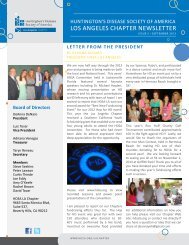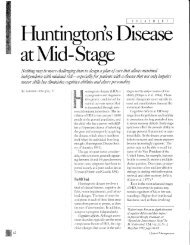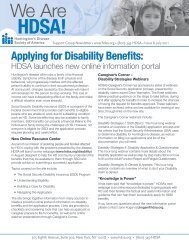Understanding Behavior in HD.final.8-18-05 - Huntington's Disease ...
Understanding Behavior in HD.final.8-18-05 - Huntington's Disease ...
Understanding Behavior in HD.final.8-18-05 - Huntington's Disease ...
Create successful ePaper yourself
Turn your PDF publications into a flip-book with our unique Google optimized e-Paper software.
23<br />
SUGGESTIONS FOR COMMUNICATION<br />
• Allow the person enough time to answer questions or express him/herself. Remember, it is not necessary<br />
to speak slowly yourself, s<strong>in</strong>ce the person with <strong>HD</strong> generally understands well. He or she just needs<br />
additional time to respond.<br />
• Offer cues and prompts to get him or her started. Fill <strong>in</strong> words that may be on the tip of the tongue, but<br />
be sensitive about “putt<strong>in</strong>g words <strong>in</strong> someone’s mouth.”<br />
• Give choices. Rather than ask<strong>in</strong>g, “What do you want for d<strong>in</strong>ner?” give specific choices like, “Do you want<br />
lasagne or spaghetti?” or, “Would you like Mexican or Japanese food?”<br />
• Break the task or <strong>in</strong>structions down <strong>in</strong>to small steps. Rem<strong>in</strong>d yourself that most of our daily tasks are very<br />
complex activities.<br />
• If the person is confused, modify what you are say<strong>in</strong>g by mak<strong>in</strong>g it simpler and shorter.<br />
• If ask<strong>in</strong>g a question, phrase it <strong>in</strong> a “yes or no” or a “this or that” format.<br />
• Ask the person to repeat what you did not understand; don’t fake it.<br />
• Ask them to give you the first letter of a word you don’t understand or to spell the word.<br />
• Modify the steps of a request as the person becomes more impaired. Use simple words and short<br />
sentences.<br />
• Demonstrate what you are say<strong>in</strong>g or use visual cues.<br />
• Alphabet boards, yes/no cards or other technical communication devices should be made available to<br />
every person with <strong>HD</strong> to allow for at least a simple method of communication.<br />
• Once a person with <strong>HD</strong> loses the ability to communicate verbally, do not stop talk<strong>in</strong>g to them. This can only<br />
<strong>in</strong>tensify the feel<strong>in</strong>gs of isolation that accompany los<strong>in</strong>g speech.<br />
• Request speech therapy.<br />
MEMORY<br />
DEFINITION<br />
Memory is the ability to learn and remember <strong>in</strong>formation. The primary memory problems <strong>in</strong> <strong>in</strong>dividuals<br />
affected by <strong>HD</strong> are the follow<strong>in</strong>g:<br />
1) An impaired ability to learn new <strong>in</strong>formation.<br />
2) An impaired ability to recall remembered <strong>in</strong>formation.<br />
POSSIBLE CAUSES<br />
1) An impaired ability to learn new <strong>in</strong>formation. This is most likely due to the disruption of the circuits<br />
connect<strong>in</strong>g the frontal lobes and the caudate <strong>in</strong> the bra<strong>in</strong>. Without efficient usage of the frontal lobes, persons<br />
with <strong>HD</strong> experience impairments <strong>in</strong> the ability to organize and sequence the <strong>in</strong>formation to be learned. When<br />
<strong>in</strong>formation is not organized <strong>in</strong> an efficient manner, retention and recall of the <strong>in</strong>formation is very difficult.

















